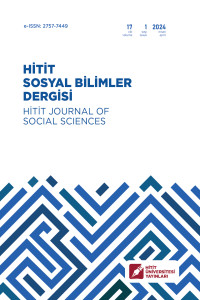Rusya-Ukrayna Savaşının Hisse Senedi Getirileri Üzerindeki Etkisi: BIST Elektrik Endeksi Üzerine Bir Uygulama
The Effect of the Russia-Ukraine War on Stock Returns: An Application on BIST
Author(s): Emre Aktümsek, Binali Selman ErenSubject(s): National Economy, Financial Markets, Socio-Economic Research, Russian Aggression against Ukraine, Russian war against Ukraine
Published by: Hitit Üniversitesi
Keywords: Russia-Ukraine War; BIST Electricity Index; Event Study; Investor Reaction; Stock Return;
Summary/Abstract: Russia recognized the independence of Donetsk and Luhansk regions on February 21, 2022. Three days later, following Putin's speech on Russian state television 'on the conduct of a special military operation', Russian troops invaded Ukrainian territory on February 24, 2022. The response of the developed economies has been the rapid imposition of economic and financial sanctions against Russia. After the sanctions were imposed in the immediate aftermath of the Russian invasion, the Russian ruble depreciated by 20.7% against the US dollar in a single trading day (February 28, 2022). Besides, the Russia-Ukraine war also affected the supply of crude oil, the world's most traded and utilized commodity. Crude oil has economic importance and a constant link to many other financial and commodity markets. The war therefore had a global impact on financial markets and investor behavior, even though it directly involved only two countries. This study examines the effect of the Russia-Ukraine war on the stock returns of companies listed in the BIST electricity index. It is aimed to contribute to the empirical findings on the investor reaction to the fluctuations in global markets on February 24, 2022, when Russia announced that it had launched a military operation against Ukraine. There are numerous empirical findings in the literature that negative cumulative abnormal returns have been observed in global stock markets since the beginning of the Russia-Ukraine war. From this point of view, this study aims to determine the impact of the Russian-Ukrainian war on the stock returns of BIST electricity index companies that are most related to energy production and consumption. The empirical analysis of the study is based on the event study method used to analyze the impact of sudden events on the stock market. Normal returns are calculated using data from the forecast window. Among all models, the Ordinary Least Squares (OLS) market model gives the most superior results for an event study analysis. To measure investors' reaction to the event, we calculate the daily abnormal return (AR) for each day in the event window and then the cumulative abnormal return (CAR) for each day in the event window by summing these returns. AR is defined as the difference between the actual return of the security on a given day and the expected return predicted by any forecasting model. In the study, average abnormal returns (AAR) are calculated 10 days before and 10 days after the event (-10, +10) to observe the pre-event and post-event investor reaction. In the second stage, cumulative average abnormal returns (CAAR) were calculated in seven different windows (-1,+1), (-2,+2), (-3,+3), (-4,+4), (-5,+5), (-6,+6) and (-7,+7). Statistical significance of all CAAR and AAR values are tested with both parametric and non-parametric tests. Accordingly, on the event day of February 24, 2022 (0 AAR window), investors had a strong negative return of approximately 5% compared to the benchmark index, the BIST 100 index. Energy companies were found to have negative CAARs in all event windows in the second phase. Within these windows, the highest negative CAAR value compared to the BIST 100 was realized at -5.5% in the event window (- 3,+3). It is thought that this situation may have resulted from the panic selling of the investors. The findings show that the stocks of BIST energy companies faced statistically significant negative returns in the face of the outbreak of the Russia-Ukraine war. It is thought that this situation may be due to the investors' directing their investments to markets that are expected to be less affected by the war, or to other sectors due to the uncertainty in the energy sector.
Journal: Hitit Sosyal Bilimler Dergisi
- Issue Year: 17/2024
- Issue No: Sp. Issue
- Page Range: 159-171
- Page Count: 13
- Language: Turkish

